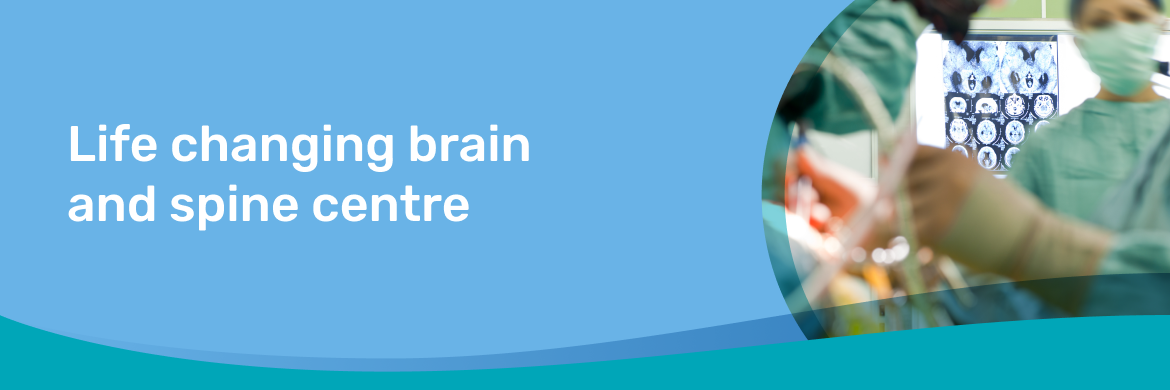
Brain and spine surgery
When you come to us for brain or spine surgery, you’re in highly-skilled hands. Our team of world class neurosurgeons, orthopaedic spine surgeons and neurologists work in a state-of-the-art facility, where the focus is always you.
We’re located in Wantirna, VIC and welcome patients from all over Victoria.
Find a neurosurgeon
Our neurosurgeons are dedicated to treating patients with neurological conditions and disorders.
Find a spine surgeon
Our orthopaedic spine surgeons and neurosurgeons are experts at treating a range of spine conditions.
Find a neurologist
Our team of neurologists work with patients living with conditions affecting the nervous system.
Conditions and disorders
We provide expert care for a range of neurological and spinal conditions.
Brain tumour surgery is one of the most common neurosurgical procedures. As tumours grow, they can affect brain function and lead to a range of symptoms. Surgery is designed to alleviate symptoms and, in cases of brain cancer, maximise the effectiveness of oncology treatments. Surgery may involve a biopsy to test a tumour testing, along with removing and/or reducing the tumour.
Blood vessels that supply oxygen to the brain can become blocked, malformed, or tear, making a stroke highly likely. Conditions like bulging blood vessels (aneurysms), blocked arteries, and arteriovenous malformations (AVMs) may require urgent neurosurgery.
The peripheral nervous system connects the brain and spine (central nervous system) to the body. Peripheral nerves can be affected by pressure, injury or growths (usually benign), leading to symptoms including pain, tingling and movement difficulties. Surgery aims to relieve symptoms and restore function.
These tumours form in the space below the brain, behind the eyes and nose, and can be malignant or benign. They need to be removed to alleviate pressure on the brain areas and vital nerves involved in movement, vision and hormonal function. Minimally invasive neurosurgery is often appropriate for skull base procedures.
Our specialists perform procedures to treat spinal conditions including compressed or ‘pinched’ spinal nerves, degenerative disc disease, spinal stenosis, trauma, deformities like scoliosis, and tumours. We specialise in endoscopic spine surgery (ESS) which is minimally invasive spinal surgery performed through a keyhole approach.
Brain and spinal surgery
Our highly skilled neurosurgeons and orthopaedic spine surgeons use the latest technology to manage a range of conditions affecting the nervous system. Our world class surgeons perform a range of procedures:
Neurosurgery
- Acoustic neuromas
- Awake craniotomy
- Brain surgery
- Brain based tumours
- Cerebrovascular disorders
- Interventional neuroradiology
- Peripheral nerve surgery
- Trigeminal neuralgia.
Neurology services
- Neurological disorders such as Parkinson's disease, multiple sclerosis (MS) and motor neurone disease
- Degenerative disorders, such as Alzheimer's disease
- Brain or spinal injuries
- Nervous systems infections such as meningitis or brain abscesses
- Headaches and migraines
- Seizures, epilepsy and EEG studies
- Peripheral neurological conditions and nerve conduction studies
- Movement disorders and functional neurological disorders.
Spine surgery
- Cervical discectomy (fusion and disc replacement arthroplasty)
- Lumbar decompression for canal stenosis (minimally invasive and open)
- Lumbar discectomy (minimally invasive and open), including day-case surgery
- Lumbar fusion (minimally invasive and open)
- Brainlab lumbar fusion (PTP)
- Endoscopic spine surgery (ESS)
- Minimally invasive spine surgery.
Endoscopic spine surgery (ESS)
Endoscopic spine surgery (ESS) is used to treat spinal disorders and conditions including disc herniation, spinal stenosis and degenerative disc disease requiring spinal stabilisation. It’s a minimally invasive procedure designed to facilitate a quicker recovery time.
Knox Private Hospital has embraced this technology and established the technique as a standard of patient care. Modern navigation technology like Joimax allows surgeons to visualise the position of the endoscopic instruments as they are placed in the patient’s body, reducing radiation exposure and surgical personnel as there is less reliance on x-rays.

Why choose Knox Private Hospital?
At Knox Private Hospital there are minimal wait times for surgery, and you can choose your own specialist.
Our neurosurgeons, orthopaedic spine surgeons and neurologists work with a multidisciplinary team of experts to get the best possible outcome for you. Our nurses deliver exceptional care before surgery in theatre setting and afterwards in our wards, with passionate allied health professionals to support your recovery.
Our expert team are here to make sure your experience is as comfortable as possible, and our friendly staff will be with you from pre-admission through to your post-operative care.
The private experience
When you choose private, expect better.
At Knox Private Hospital, your private patient experience includes:
- Specialist of your choice
- Admission at a time that is convenient
- Accommodation mainly in single rooms with ensuite
- Private dining menu
- Discharge planning support
- PressReader – digital access to 7,000+ magazines, newspapers and other publications.

Care after brain and spine surgery
We provide comprehensive quality care. Following surgery, you will be cared for on a dedicated ward by experienced nursing staff who are skilled in spinal and cranial surgeries and who will arrange your physiotherapy, discharge rehabilitation and any other support services you require.
Risks
All surgical procedures carry some amount of risk and only a specialist doctor can advise whether surgery is right for you. Before agreeing to any treatment, make sure you understand what’s involved and any possible side effects and risks. It’s vital that you seek specialist medical advice that’s right for your circumstances.
How much will it cost?
Surgeries and treatments performed in a private hospital involve an out-of-pocket fee. The amount will depend on the surgery or treatment you have and - where you have private health fund cover - whether the treatment that is right for you, is included in that cover. Your specialist will be able to give you an indication of out-of-pocket costs.
If you don’t have private health insurance or you’re an overseas patient, you can choose to self-fund your surgery. Your specialist can talk to you about this option.

